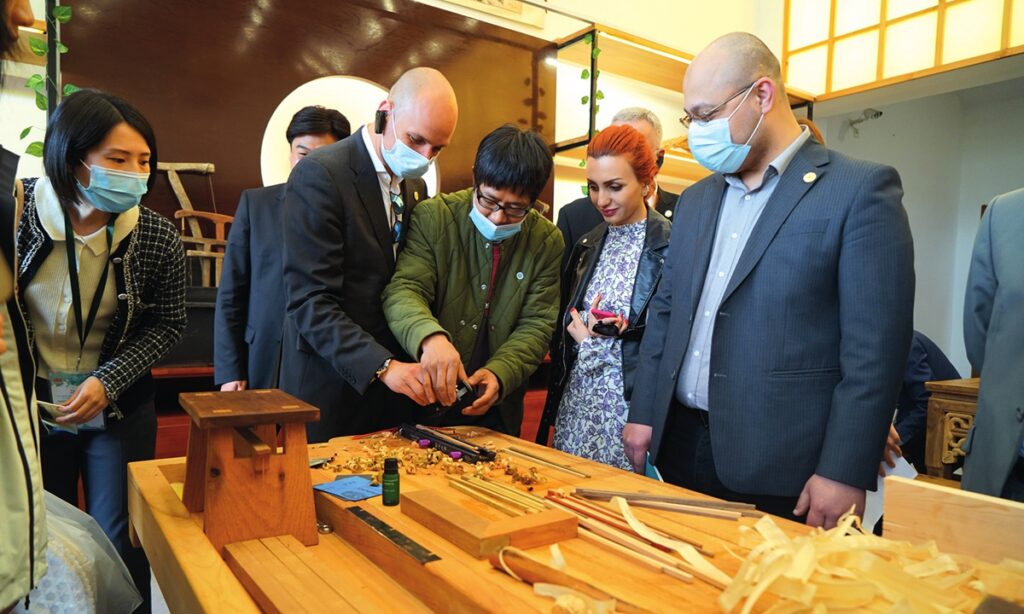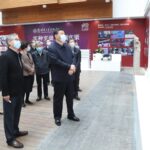On April 15, dozens of foreign diplomats visited Yucun, a small village in East China’s Zhejiang Province that is hailed as one of the most beautiful villages with its fresh air, clear rivers, lush mountains and clean streets.
Diplomats were surprised when hearing this lush, paradisiac village was once a heavily polluted mining area decades ago.
Local people recalled how the village looked like at the beginning of the century. “There were always the days when the sky was grey, white mud floated down the rivers, and leaves were covered with dust,” villager Pan Chunlin told the Global Times. Having long lived in a dusty environment, they seldom opened the window and some villagers even suffered with pneumoconiosis for years, Pan said.
Fortunately, this formerly uninhabitable village has now turned into a model of China’s rural areas seeking sustainable and eco-friendly growth through nearly 20 years of effort. With the “green development” guidance of the Communist Party of China (CPC), Yucun shut down its mines and shifted to the protection of local environment and natural resources.
Through the development of the ecotourism, the yearly per capita income of Yucun villagers increased sevenfold in 16 years, jumping from 7,576 yuan ($1,162) in 2004 to 55,680 ($8,566) yuan in 2020, official data showed.
Yucun’s transformation impressed the visiting diplomats. This is a change from a purely quantitative economic growth to a development of quality of life, said Ambassador of Luxembourg to China Marc Hübsch.
Natural resources are the most valuable assets, Hübsch told the Global Times, praising the strategy that Chinese villages like Yucun adopted in pursuing development through taking advantage of their natural beauties. He added that they are going in “a right way”, which is “truly impressive.”
Green development
Combining economic growth with environment protection is an essential part of the green and sustainable development that the CPC has been emphasizing in recent years.
In 2005, Xi Jinping, then Party secretary of CPC Zhejiang Provincial Committee, proposed that “clear waters and lush mountains are invaluable assets,” during an inspection trip to Yucun. The concept later became a guidance for Yucun and for tens of thousands of villages across China to work towards high-quality growth through the development of eco-friendly industries.
At Yucun, local Party officials started to encourage villagers, who lost their jobs overnight after the shutdown of the local mines, to build hotels and entertainment facilities to attract potential visitors and make a living.
“It was extremely difficult to mobilize villages at the beginning,” Yu Xiaoping, deputy Party chief of Yucun, told the Global Times. “They were quite hesitant and afraid to work in tourism and be unable to make some money. Ecotourism was such a brand-new concept in those years that there was almost no precedent.”
Pan, formerly employed by a local mine as a driver, was one of the first villagers who were persuaded to set up a guesthouse in 2004. With the gradual improvement of the local environment, the number of Pan’s customers has kept increasing these years, from zero to more than 200 a day. “I have very good business now,” he told the Global Times.
Xi served as the Party chief of Zhejiang between 2002 and 2007. In 2003, he initiated the Double-Eight Strategy for Zhejiang’s development, which identified eight strengths of the province in terms of economic structure, including geological position, industries, coordinated development of urban and rural areas, ecology, mountain and ocean resources, environment and culture. The strategy also defined the eight measures Zhejiang is adopting to take further advantage of these strengths.
The strategy focuses on an ecological construction, to “build a green Zhejiang.” “Xi once said, ‘a government that does not pay attention to ecology is not a clear-minded government,'” recalled Lü Zushan, former deputy Party chief of Zhejiang, according to an article by the Study Times published in March 2021.
Lü said that during Xi’s term in Zhejiang, the local government conducted investigations on 573 enterprises engaged in heavy polluting industries, including chemical industry, leather and smelting, and spent five years in solving environmental problems among more than 10,000 villages across the province, such as garbage disposal and sewage management.
The green transformation of Zhejiang villages attracted worldwide attention. In September 2018, Zhejiang’s Green Rural Revival Program was recognized with the Champions of the Earth award, the UN’s highest environmental honor. “This exceptionally successful eco-restoration program shows the transformative power of economic and environmental development together,” according to the UN.
On April 15, like many other tourists visiting Yucun, the diplomats walked around the village, enjoyed the scenery and bought handicrafts and farm products.
“I’m very impressed with the beauty of this village and with what they’ve done to take advantage of the beauty,” said Malaysian Ambassador to China Raja Nushirwan Zainal Abidin.
“Thanks to the vision of President Xi Jinping, when he was the Party secretary of Zhejiang, he mentioned that it was important for both economic growth as well as the ecology,” Abidin told the Global Times, saying that he’d been to some other Chinese villages that also work to achieve economic growth through green industries.
“I think that the vision of taking economic advantage out of a beautiful environment and ecology has taken root in all parts of China,” he added.
Party at grassrootsThis year marks the 100th anniversary of the founding of the CPC. Invited by the International Department of the CPC Central Committee, some 40 foreign diplomats, including several ambassadors to China, visited Zhejiang last week. During the visit they learned how Zhejiang, one of China’s most developed provinces, works to achieve economic growth and make life better for people under the guidance of President Xi and the Party.
The frontline grassroots Party organizations and officials play a critical role in the development of villages in Zhejiang. Local residents told the Global Times that they regard the Party branches at their villages, the most basic level of CPC organizations in the Chinese countryside, as the backbone of village development.
The grassroot democratic governance in Chinese rural areas has been a topic of interest to many foreigners. The village meeting at Lujia, another eco-friendly village in Zhejiang, was held on April 14 with more than 70 Party members and villager representatives gathering to discuss whether to adopt a plan to build a forest park.
The meeting was livestreamed that day as part of a CPC’s event in Zhejiang’s capital, Hangzhou, which attracted nearly 400 diplomats and political Party representatives from more than 70 countries. At the event, Austrian Ambassador to China Friedrich Stift asked the village’s Party chief about how the Party branch in his village works, and how the branch members are elected.
In response, Lujia’s Party Secretary Zhu Renbin explained that the branch discusses with villagers every big policy or project and introduces the project details, including financial costs, to the public.
“We branch members are elected by ordinary villagers through a quinquennial election,” Zhu introduced. “Villagers will not vote for us the next time if they are not satisfied with our work.”
Malaysian Ambassador Abidin said he was impressed by the level of knowledge that the CPC officials have about their work.
“You go to a particular building at a county and they are able to tell you what this building is for, when it was built, and how well it’s doing so far,” Abidin said at a group interview in Hangzhou on April 13. The CPC officials are very clear about their work and know well what they should do, he added.
In Zhejiang’s Chengxi village, the CPC officials helped fix a road within 40 days after hearing the villagers’ requirements. The narrowest parts of the road were once just 1.5 meters wide and only allowed one vehicle at a time to pass, causing many inconveniences to local people, said the village’s Party Secretary Zhang Guojin.
“To solve it as soon as possible, we finished the project’s approval and biding within one week and then completed the whole project within one month, widening the narrow parts of the road to five meters,” Zhang told the Global Times.
Local resident Zhou Yanxiang praised the efficiency of Zhang and other local grassroots Party officials in solving problems for people. “Now it’s much more convenient for us to walk or drive on this road,” he shared with the Global Times.
The high efficiency is also a guarantee that regional Party organizations can well implement the policies and projects of the CPC Central Committee at the local level. China has shown that it is good at doing great projects, like the constructions of high-speed railways, bridges and highways, said Stift. “Over the past 30 years, not many countries have done so many big projects like China,” he told the Global Times.
During the visit, Zhang shared with foreign diplomats how the nine Party secretaries that Chengxi village has had, including him, transformed the village, from suffering food shortage in the 1960s into a renowned wealthy village with a local yearly per capita income of more than 80,000 yuan.
Touched by Zhang’s story, Chilean Ambassador to China Luis Schmidt Montes said he realized it’s the hard work of the CPC officials at various levels that enables the Party’s policies to be carried out across China continuously.
“I think this is also an important reason that the CPC can lead the government and people to achieve the victory on poverty alleviation in 2020,” Montes told the Global Times. China’s poverty eradication project is a global model worth for other countries to learn from, he praised.
For the people
China achieved victory in the largest battle against extreme poverty worldwide, as shown by the fact that 98.99 million rural residents, 832 impoverished counties and 128,000 poor villages had all been lifted out of absolute poverty, according to a white paper on poverty alleviation the country issued earlier this month.
That “created a miracle in human history,” read the white paper.
“The CPC is very successful in this aspect,” commented Mahbub Uz Zaman, Bangladeshi Ambassador to China, saying that his country can take the example of China in eradicating poverty.
“Poverty alleviation is our top priority for improving the lives of people, especially improving the income of the lower income groups,” Ambassador Zaman told the Global Times. We can learn from China’s intervention programs targeting low income people, such as education or training, as well as the financial subsidies on these programs, he added.
Yu said that during Yucun village’s green development, local Party officials tried their best to organize training courses on tourism for the villagers, teaching them to become tour guides, travel agents and sightseeing bus drivers. After Pan’s guesthouse business improved, he was often invited to share his experiences with other villagers who were also interested in this industry.
Ambassador Abidin mentioned that the close connection between the CPC and Chinese people is one of the main reasons that the Party remained vital in the past 100 years. “It is in touch with the needs and expectations of the ordinary people and is in the position to deliver on what these expectations are,” he said.
This year, after reaching the poverty lifting goal, the Party calls for greater efforts in promoting rural revitalization as a major task. Chinese experts estimated that with the country focusing more on sustainable and inclusive growth, green and environmentally friendly farming to benefit rural residents is expected to be a major area of development.
At Chengxi village, Zhang told the Global Times that some of the projects that the Party branch will carry out in the next five years include improving water quality of a local river and construction of an elderly care center.
“I will keep stepping up efforts in bringing better life to my village and its people,” he said.
Foreign diplomats expereince woodcarving at Yucun village on April 15. Photo: Huang Lanlan/GT



